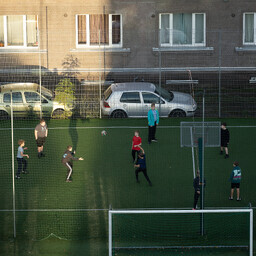Haridusministeerium saatis aprillis kooskõlastusele uue määruse eelnõu. See määrus lisab üldhariduskoolidele palju uusi nõudeid. Näiteks peaksid
koolitunnid algama kell üheksa
, mitte kaheksa. Samuti peab
koolihoovis olema muru niidetud
ja
seinad värvitud mitteläikiva värviga
. Koolijuhid ei toeta neid muudatusi. Nad arvavad, et
määrus vajab täiendamist
ja selgemat sõnastust.
koolitunnid algama kell üheksa
Tõlge fraasile: koolitunnid algama kell üheksa
EN
school lessons start at nine o'clock
koolihoovis olema muru niidetud
Tõlge fraasile: koolihoovis olema muru niidetud
EN
the schoolyard grass must be mowed
seinad värvitud mitteläikiva värviga
Tõlge fraasile: seinad värvitud mitteläikiva värviga
EN
walls painted with matte paint
määrus vajab täiendamist
Tõlge fraasile: määrus vajab täiendamist
EN
the regulation needs improvement
Koolijuhid ütlesid, et määrus on õiguslikult ebaühtlane. Näiteks peab igas ruumis olema tehisvalgus, kuid
õhu liikumiskiirus ruumides
peab jääma alla 0,21 meetri sekundis. Koolijuhid leiavad, et määrus ei jäta neile piisavalt vabadust otsustada, kuidas kooli asju korraldada.
õhu liikumiskiirus ruumides
Tõlge fraasile: õhu liikumiskiirus ruumides
EN
air movement speed in rooms
Koolijuhid küsivad ka,
kes maksab muudatuste eest
. Näiteks
ventilatsiooni nõuetele vastavaks muutmiseks
on vaja palju raha. Samuti küsivad nad, kas neil tuleb luba, kui nad tahavad
koolipäeva alustada kell kaheksa
.
kes maksab muudatuste eest
Tõlge fraasile: kes maksab muudatuste eest
EN
who will pay for the changes
ventilatsiooni nõuetele vastavaks muutmiseks
Tõlge fraasile: ventilatsiooni nõuetele vastavaks muutmiseks
EN
to bring ventilation up to standards
koolipäeva alustada kell kaheksa
Tõlge fraasile: koolipäeva alustada kell kaheksa
EN
start the school day at eight o'clock
Koolitundide algusaja nihutamine kella üheksaks võiks rakenduda alates 1. septembrist 2026. Selleks oleks koolidel rohkem aega oma päevakavade üle mõelda. Koolijuhid pakuvad kompromissina, et
tundide algus võiks olla 8.30
.
tundide algus võiks olla 8.30
Tõlge fraasile: tundide algus võiks olla 8.30
EN
the start of lessons could be at 8:30
Koolijuhid kritiseerivad ka ruumidele seatud nõudeid. Näiteks peab igas õpperuumis olema
sooja ja külma vee varustus
. Vanemates koolimajades on aga ainult külma vee varustus. Selle muutmiseks on vaja palju raha.
sooja ja külma vee varustus
Tõlge fraasile: sooja ja külma vee varustus
EN
supply of hot and cold water
Kokkuvõttes arvavad koolijuhid, et määrus lisab neile palju uusi ülesandeid. Näiteks peavad nad korraldama personali esmaabikoolituse ja
dokumenteerima keskkonnariske
. Koolijuhid soovivad, et muudatuste rakendamiseks antaks rohkem aega kui vaid suvi.
dokumenteerima keskkonnariske
Tõlge fraasile: dokumenteerima keskkonnariske
EN
documenting environmental risks
In April, the Ministry of Education sent a draft regulation for coordination. This regulation adds many new requirements for general education schools. For example, school classes should start at nine o'clock, not eight. Also, the schoolyard must have the grass mowed and the walls painted with non-glossy paint. School leaders do not support these changes. They believe the regulation needs improvement and clearer wording.
School leaders said that the regulation is legally inconsistent. For example, every room must have artificial lighting, but the air movement speed in the rooms must remain below 0.21 meters per second. School leaders find that the regulation does not leave them enough freedom to decide how to organize school matters.
School leaders also ask who will pay for the changes. For example, a lot of money is needed to make the ventilation comply with the requirements. They also ask whether they need permission if they want to start the school day at eight o'clock.
The shift of the start time of school classes to nine o'clock could be applied from September 1, 2026. This would give schools more time to think about their schedules. School leaders offer a compromise that the start of classes could be at 8:30.
School leaders also criticize the requirements set for the rooms. For example, every classroom must have hot and cold water supply. However, in older school buildings, there is only cold water supply. Changing this requires a lot of money.
In conclusion, school leaders believe that the regulation adds many new tasks for them. For example, they must organize first aid training for staff and document environmental risks. School leaders wish that more time than just the summer would be given to implement the changes.

